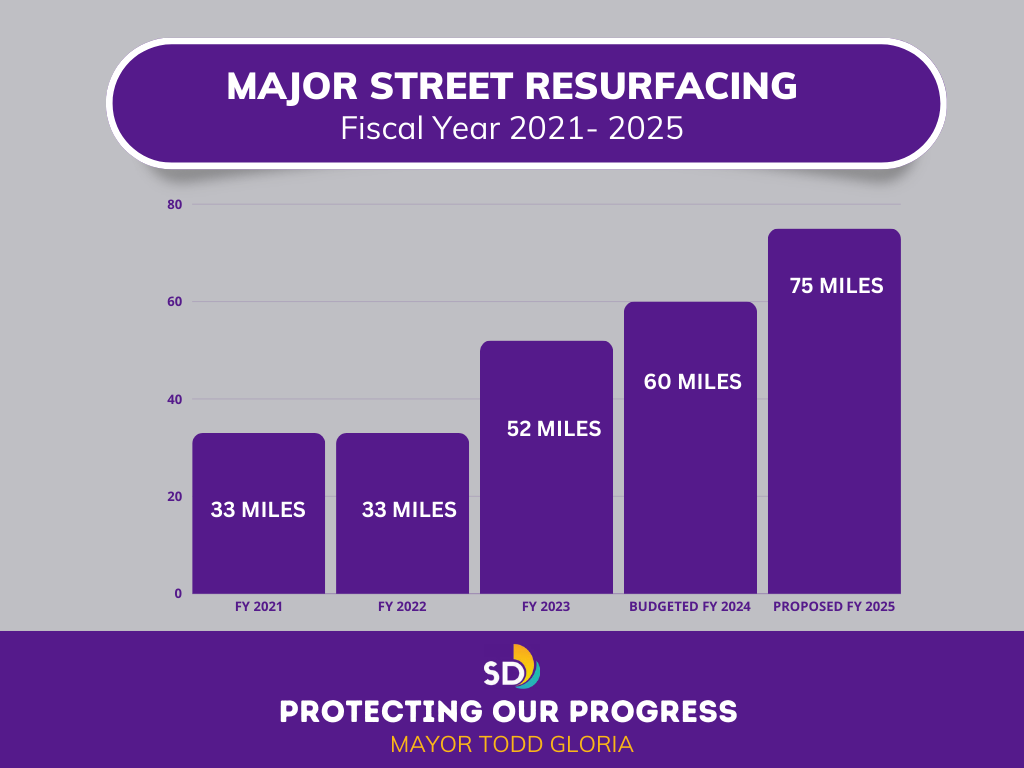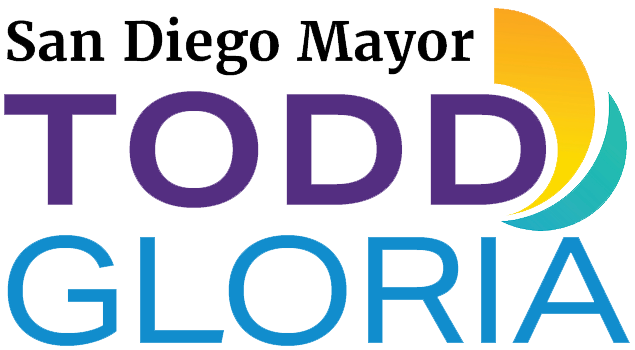Mayor Gloria’s ‘Protecting our Progress’ Budget Delivers on Key Priorities, Maintains Core Services
DESPITE A CHALLENGING FISCAL CLIMATE, FY25 PROPOSED BUDGET PROTECTS STRIDES CITY HAS MADE ON HOMELESSNESS, HOUSING, ROAD REPAIR, PUBLIC SAFETY
FOR IMMEDIATE RELEASE
April 12, 2024
CONTACT:
MayorPress@sandiego.gov
SAN DIEGO, CA – Amid a challenging fiscal climate, Mayor Todd Gloria today released his Fiscal Year 2025 proposed budget -- a $5.65 billion spending plan focused on preserving the progress the City has made over the past three years to reverse years of underinvestment in San Diego’s infrastructure, workforce, and services.
“This proposed budget is on-time, balanced and will continue the business of moving San Diego forward. With revenue down and costs rising, we had to make difficult choices in order to sustain funding for key priorities: addressing homelessness and building more housing; fixing roads and other critical infrastructure; and keeping you safe,” Mayor Todd Gloria said. “We were able to avoid the most dire cuts by using one-time measures we cannot responsibly repeat next year, so a major part of this process will be how we reckon with our structural deficit.”
“I commend Mayor Gloria for proposing a balanced budget while continuing to invest in streets, homeless services and public safety,” said City Councilmember Kent Lee, who represents District 6. “As Chair of the Budget and Government Efficiency Committee, I look forward to working with the public and the City Council to pass a fiscally responsible budget that continues to make progress on San Diego’s greatest needs — increasing the supply of affordable housing, investing in road repair and neighborhood infrastructure and keeping our communities safe.”
The proposed budget maintains key services by trimming primarily non-personnel expenses from department budgets, sweeping the unused balances from various special funds back into the General Fund, suspending contributions to discretionary grant program accounts and deploying other one-time measures.
These strategies allowed Mayor Gloria to continue delivering on residents’ key priorities.
Addressing Homelessness and Building More Housing
The proposed budget increases funding to address homelessness by $26.6 million, allowing the City follow through on two transformative projects that will dramatically boost the number of options to get people experiencing homelessness off the street and out of canyons and riverbeds.
One allocation included in the Mayor’s budget is the proposal to turn H Barracks, the City-owned former Navy land adjacent to the San Diego International Airport, into roughly 200 spaces to the City’s Safe Parking Program. This would nearly double the capacity of the highly successful program, with the potential for adding a Sprung structure in the future, should it become necessary.
The second new proposed allocation, announced last week, is the city’s largest-ever homeless shelter. Located at Kettner Boulevard and Vine Street in Middletown, it would add approximately 1,000 beds to the City’s homeless shelter network.
Once these two projects are completed, the City will have more than tripled the number of opportunities for unsheltered San Diegans to come off the street end their homelessness. These offerings include shelter, Safe Parking and Safe Sleeping sites.
Preventing and solving homelessness requires more housing, and the proposed budget supports Mayor Gloria’s efforts to speed up the creation of affordable and middle-income homes near transit by fully funding the personnel needed to review, within 30 days, projects under the Affordable Housing Permit Now and Complete Communities Now programs.
To date, Affordable Housing Permit Now, created by an executive order Mayor Gloria signed in January 2023, has fast-tracked 21 projects, totaling 2,356 new affordable homes, with another 478 in process. Of the permitted projects, 13 are already under construction, totaling 1,700 units. Complete Communities Now, created by a second executive order signed this past January, expedites housing projects near transit and was fully implemented in March.
Fixing Roads and Other Critical Infrastructure
The proposed budget earmarks $104.6 million for street resurfacing construction and design, a significant investment that will increase the number of miles of major street resurfacing from 60 budgeted in the current fiscal year to 75 miles in FY2025 and funds the design and planning needed to complete 105 miles in FY2026.

Last week, the City Council was presented with the Gloria administration’s Pavement Management Plan, which uses the most comprehensive assessment ever performed to drive decision-making on street maintenance and investment strategies. This innovative approach allows the City to proactively pinpoint funding needs to prioritize spending.
On stormwater, the proposed budget includes $85.1 million in funds for flood control and green infrastructure projects. This is in addition to the proactive investments the City has been making under the Water Infrastructure Finance and Innovation Act (WIFIA). Through WIFIA, the City is using the Environmental Protection Agency’s special loan program for water infrastructure projects, covering 49% of up to $733 million in stormwater upgrades, which range from pipeline replacements and pump station repairs to comprehensive watershed restoration.
Keeping San Diego Safe
Mayor Gloria is preserving core service levels in the Police and Fire-Rescue departments by making only minimal reductions to their budgets. This is offset by critical additions, such as funding to cover 12 new positions and operating costs for the Torrey Pines fire station, which will open later this year.
Underscoring the fiscal challenge at hand, fire station brownouts were initially considered during the development of the proposed budget, as were reductions of police neighborhood patrols. The City’s finance team were able to these public safety impacts by identifying reductions elsewhere.
Budget Reductions
With the $136.8 million shortfall the City of San Diego is facing this year, the Mayor’s proposed budget minimizes service-level impacts to residents. In doing so, it necessarily includes reductions to funding for departments across City government.
For example, the budget eliminates funding for the Office of Immigrant Affairs; reabsorbs the Community Equity Fund into the general fund budget; and suspends for one year contributions to the City’s reserves, as well as some discretionary grant funding programs like the City Council’s Community Projects, Programs and Services (CPPS) program. In addition, the proposed budget eliminates the Cannabis Social Equity Program; taps the remaining balance in the Climate Equity Fund and suspends all but $1.5 million of the usual $10 million annual contribution into the fund for Fiscal Year 2025.
These reductions are difficult but necessary to preserve core services and are anticipated to be one-time adjustments.
As part of the budget’s development, every department is asked to consider and document what impacts their spending proposal will have on equity and the City’s ongoing effort to eliminate longstanding racial and economic disparities. Each department received training from the City’s Department of Race and Equity on how to look at their operational and budgeting decisions through an equity lens to ensure they’re considering how they might perpetuate or remediate existing disparities.
Pursuant to the City Charter, Mayor Gloria is required to announce a formal budget by April 15. He will formally present his proposed budget to the City Council on April 22. This will be followed by several weeks of department-level public hearings leading up to the release of a revised budget on May 14 that incorporates City Council and community feedback. Final consideration by the City Council will take place in mid-June, with adoption of an appropriation ordinance due no later than June 30.
###


